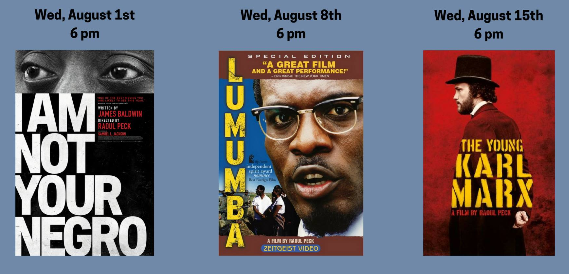Raoul Peck is a storyteller of immense power and precision. Through his lens, he challenges perceptions, reframes history, and uplifts voices long suppressed. The Haitian filmmaker has carved a niche for himself by boldly tackling issues of race, history, and colonialism, using cinema as a tool for advocacy. His profound work, spanning several decades, offers a critical reflection of society, particularly the Haitian experience. In this blog post, we explore his cinematic journey, the significance of his films, and the ways in which he continues to shape Haiti’s narrative on the global stage.
The Journey of a Visionary

Raoul Peck, a name synonymous with powerful storytelling and social justice, has emerged as a pivotal figure in contemporary cinema. Born on September 9, 1953, in Port-au-Prince, Haiti, Peck’s journey has been anything but ordinary. His films delve deep into the complexities of identity, history, and culture, often reflecting his Haitian roots and the broader African diaspora. With a career spanning over three decades, Peck has become a beacon of hope for those seeking to understand the intricacies of Haitian narratives and the African experience.
Peck’s early life was marked by upheaval and displacement. His family fled Haiti during the dictatorship of François Duvalier, seeking refuge in France. This experience of exile profoundly influenced Peck’s worldview and artistic vision. His films often grapple with themes of colonialism, identity, and the fight for justice, making him a vital voice in the global conversation about race and history.
The Impact of “I Am Not Your Negro”

One of Peck’s most acclaimed works, I Am Not Your Negro, released in 2016, is a poignant exploration of race relations in America through the lens of James Baldwin’s unfinished manuscript. The film received an Academy Award nomination and won numerous accolades, solidifying Peck’s status as a master storyteller. Through Baldwin’s words, Peck illuminates the struggles faced by African Americans, weaving together historical footage and contemporary imagery to create a powerful narrative.
The film’s success is not merely a reflection of its artistic merit but also of its timely relevance. In a world grappling with issues of systemic racism and social injustice, Peck’s work resonates deeply, urging audiences to confront uncomfortable truths about America’s past and present. Critics have praised I Am Not Your Negro for its emotional depth and intellectual rigor, further establishing Peck as a filmmaker who challenges the status quo.
Exploring Colonialism in “Exterminate All the Brutes”
In 2021, Peck released Exterminate All the Brutes, a groundbreaking HBO miniseries that tackles the brutal legacy of colonialism. This ambitious project combines documentary and fictional elements to explore the historical narratives often overlooked in mainstream discourse. By examining the impact of European colonialism on both Africa and the Americas, Peck forces viewers to confront the darker aspects of history that continue to shape contemporary society.
Exterminate All the Brutes received critical acclaim, with reviews highlighting its innovative storytelling and visual style. Peck’s ability to blend personal narratives with historical events creates a compelling tapestry that invites viewers to engage with the material on a profound level. The series serves as a reminder that history is not a distant memory but a living, breathing entity that influences our present and future.
The Heartfelt Story of “Silver Dollar Road”
Peck’s latest documentary, Silver Dollar Road, is set to release in October 2023. This film tells the poignant story of the Reels family, who have fought to retain their ancestral land in North Carolina. The documentary draws from a 2019 ProPublica article, transforming a tale of resilience and struggle into a powerful visual narrative. Peck’s approach allows the family members to share their experiences, providing an intimate look at the legal complexities surrounding land ownership and displacement.
The Silver Dollar Road story is emblematic of broader issues faced by Black families in America, particularly regarding land loss and the fight for justice. Peck’s ability to humanize these struggles through personal narratives makes the film a vital contribution to the ongoing conversation about race and land ownership in the United States. As the Reels family navigates the challenges posed by developers and legal battles, viewers are invited to reflect on the historical injustices that continue to affect marginalized communities.
Raoul Peck’s Unique Style and Approach

What sets Raoul Peck apart from other filmmakers is his unwavering commitment to authenticity and social justice. His films are not merely entertainment; they are vehicles for change. Peck’s storytelling is characterized by a deep understanding of the historical context surrounding his subjects. He often incorporates archival footage, personal testimonies, and artistic visuals to create a multi-layered narrative that resonates with audiences.
Peck’s documentaries, such as Fatal Assistance and Sometimes in April, showcase his ability to tackle complex issues with sensitivity and depth. He explores the aftermath of the 2010 earthquake in Haiti and the Rwandan genocide, respectively, shedding light on the human experiences behind these historical events. Through his work, Peck challenges viewers to confront uncomfortable truths and engage with the world around them.
The Influence of Family on Peck’s Work

Family plays a significant role in Peck’s life and work. He often draws inspiration from his own experiences and relationships, weaving them into his narratives. His daughter, who has grown up in a world shaped by her father’s artistic vision, has become a source of motivation for Peck. The themes of identity, heritage, and the fight for justice are not only personal but also universal, resonating with audiences from diverse backgrounds.
Peck’s wife has also been a supportive presence throughout his career, providing encouragement and insight as he navigates the complexities of filmmaking. This familial support has allowed Peck to remain grounded in his mission to tell stories that matter. The connections he fosters within his family are reflected in the emotional depth of his films, making them all the more impactful.
The Global Impact of Raoul Peck’s Films
Peck’s work transcends borders, resonating with audiences worldwide. His films have been screened at prestigious film festivals, earning accolades and sparking conversations about race, identity, and justice. Peck’s ability to articulate the struggles of marginalized communities has made him a prominent figure in the global film industry.
Through his documentaries and feature films, Peck has not only redefined Haiti’s narrative but also contributed to a broader understanding of the African diaspora’s experiences. His films challenge stereotypes and provide a platform for voices that have been historically silenced. By shining a light on these stories, Peck encourages audiences to engage with the complexities of history and the ongoing fight for justice.
Looking Ahead: The Future of Raoul Peck
As Raoul Peck continues to create thought-provoking films, his legacy as a visionary filmmaker is solidified. With upcoming projects, including Silver Dollar Road, he remains committed to exploring the intersections of history, identity, and social justice. Peck’s dedication to storytelling ensures that the narratives of marginalized communities will continue to be heard and celebrated.
In an ever-changing world, Peck’s films serve as a reminder of the power of cinema to inspire change. His work encourages audiences to confront uncomfortable truths and engage with the complexities of the human experience. As he forges ahead, Peck’s vision will undoubtedly continue to redefine the narrative of Haiti and the broader African diaspora on the global stage.

A Legacy of Truth and Justice
Raoul Peck’s journey as a filmmaker is a testament to the power of storytelling in shaping our understanding of history and identity. Through his documentaries and feature films, he has redefined Haiti’s narrative, challenging audiences to confront the complexities of race, colonialism, and social justice. Peck’s commitment to authenticity and his ability to humanize historical events make him a vital voice in contemporary cinema.
As we anticipate the release of Silver Dollar Road, we are reminded of the importance of preserving and sharing stories that matter. Raoul Peck’s work not only enriches our understanding of the past but also inspires us to advocate for a more just and equitable future.
Citations:
https://en.wikipedia.org/wiki/Raoul_Peck
https://www.imdb.com/list/ls527918673/
https://www.rottentomatoes.com/m/silver_dollar_road
https://www.imdb.com/name/nm0669704/
https://www.nytimes.com/2023/10/19/movies/silver-dollar-road-review-raoul-peck.html
https://www.theguardian.com/film/2023/oct/23/raoul-peck-documentary-silver-dollar-road
https://variety.com/2024/film/news/ernest-cole-lost-and-found-raoul-peck-1236008839/












Add a comment